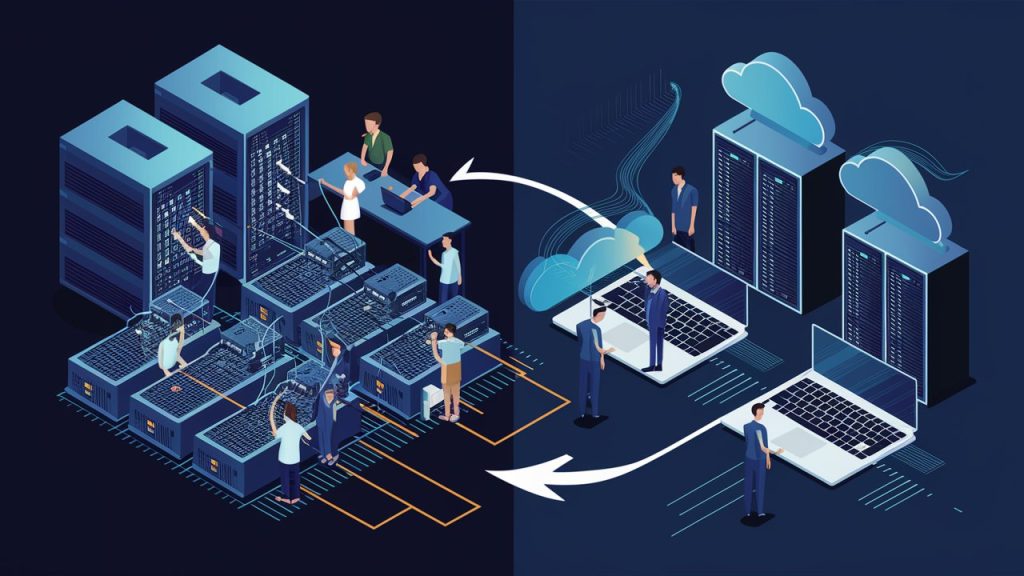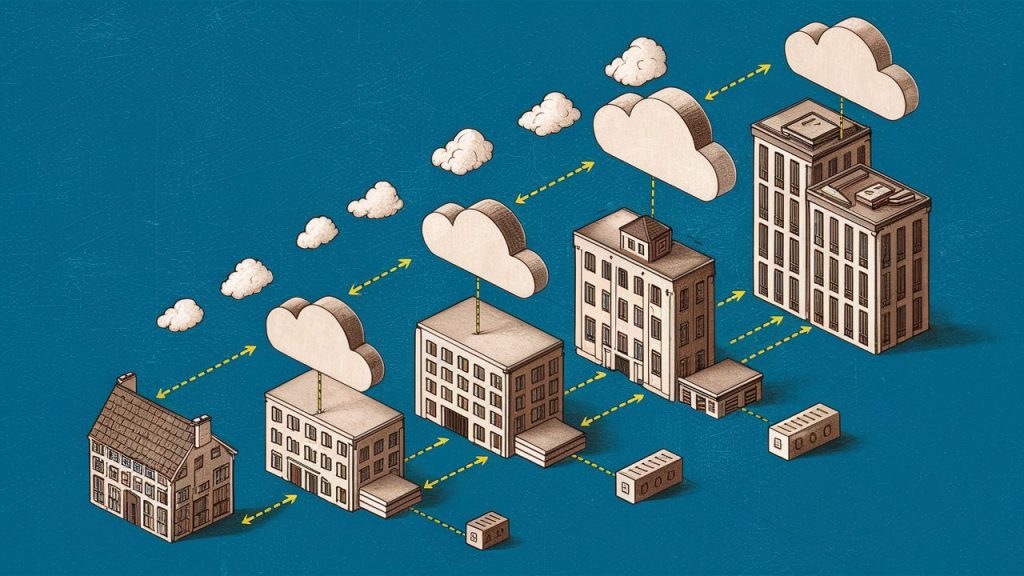Enterprise Resource Planning (ERP) systems have long been the backbone of organizations, enabling them to manage and integrate their core business processes across finance, human resources, supply chain, and more. Traditionally, ERP systems were on-premises solutions, requiring significant investments in hardware, software, and ongoing maintenance. However, with the advent of cloud computing, ERP solutions have undergone a significant transformation, making them more accessible, scalable, and efficient than ever before. This article explores role of cloud computing in modern ERP solutions and the trends that are shaping the future of this technology.
The Evolution of ERP: From On-Premises to the Cloud

Before diving into the role of cloud computing, it’s essential to understand the evolution of ERP systems. Initially, ERP solutions were housed on-site, requiring substantial capital expenditure, lengthy implementation times, and dedicated IT teams for maintenance. While these systems provided robust functionality, they often lacked flexibility, scalability, and were challenging to upgrade.
Form The Role of Cloud Computing, The rise of cloud computing has revolutionized the ERP landscape. Cloud-based ERP solutions offer a more flexible, cost-effective, and scalable alternative to traditional on-premises systems. Instead of managing hardware and software in-house, businesses can access ERP software through the internet, hosted on remote servers maintained by third-party providers. This shift has democratized access to ERP systems, allowing even small and medium-sized businesses to leverage the power of enterprise-level software.
Key Benefits of Cloud Computing in ERP Solutions

In The The Role of Cloud Computing, Cloud computing has introduced several benefits that have fundamentally changed how businesses approach ERP implementation and management. These benefits are driving widespread adoption of cloud-based ERP solutions across industries.
1. Scalability and Flexibility
One of the most significant advantages of cloud computing in ERP is its scalability. Businesses can easily scale their ERP systems up or down based on their needs without the need for significant infrastructure investments. Whether a company is expanding into new markets, launching new products, or adjusting to seasonal demands, cloud-based ERP systems can adapt quickly and efficiently.
In addition to scalability, cloud ERP solutions offer unparalleled flexibility. Companies can customize their ERP systems to meet specific business requirements, add or remove modules as needed, and integrate with other cloud-based applications seamlessly. This flexibility ensures that businesses can respond to changing market conditions and evolving business needs without being constrained by outdated technology.
2. Cost Efficiency
Cloud-based ERP solutions eliminate the need for substantial upfront investments in hardware and software. Instead, businesses pay a subscription fee based on usage, allowing them to spread costs over time and align expenses with actual needs. This cost-efficient model is particularly beneficial for small and medium-sized enterprises (SMEs) that may not have the capital to invest in traditional on-premises systems.
Moreover, cloud ERP solutions reduce ongoing maintenance costs. The service provider manages software updates, security patches, and infrastructure maintenance, freeing businesses from the burden of managing these tasks in-house. This shift allows organizations to focus their resources on core business activities rather than IT management.
3. Enhanced Accessibility and Collaboration
One of the standout features of cloud-based ERP systems is their accessibility. Because the software is hosted in the cloud, users can access it from anywhere with an internet connection. This accessibility is crucial for organizations with remote or distributed workforces, as it enables employees to collaborate in real-time, regardless of location.
Cloud ERP solutions also facilitate collaboration across departments and teams. For example, sales teams can access real-time inventory data to provide accurate delivery estimates to customers, while finance teams can monitor cash flow and generate reports from any device. This level of accessibility and collaboration enhances decision-making and ensures that all employees have access to the information they need to perform their roles effectively.
4. Faster Implementation and Upgrades
Traditional ERP systems often required lengthy implementation processes, sometimes taking months or even years to deploy fully. Cloud-based ERP solutions, on the other hand, can be implemented much faster. Rapid deployment is possible because there is no need to install hardware, configure servers, or perform extensive customizations before the system is operational.
In addition to faster implementation, cloud ERP solutions offer automatic upgrades. Service providers regularly release updates and new features, which are automatically applied to the system. This ensures that businesses always have access to the latest technology without the need for costly and disruptive upgrade projects.
5. Improved Data Security and Compliance
Data security is a top concern for any organization, particularly when it comes to ERP systems that house sensitive financial, customer, and operational data. Cloud-based ERP providers invest heavily in security measures such as encryption, multi-factor authentication, and regular security audits to protect data from unauthorized access and breaches.
Additionally, many cloud ERP solutions are designed to comply with industry-specific regulations and standards, such as GDPR, HIPAA, and SOX. This built-in compliance ensures that businesses meet their regulatory obligations and avoid the costly penalties associated with non-compliance.
6. Advanced Analytics and Business Intelligence
Modern ERP systems are not just about managing transactions; they are also about providing insights that drive better decision-making. Cloud-based ERP solutions often include advanced analytics and business intelligence (BI) tools that leverage the power of big data and AI. These tools allow businesses to analyze large volumes of data in real-time, identify trends, and make data-driven decisions.
For example, a cloud ERP system might analyze sales data to forecast demand, optimize inventory levels, or identify new market opportunities. By integrating AI and machine learning, these systems can provide predictive analytics that helps businesses stay ahead of the competition and respond proactively to changing market conditions.
Key Trends Shaping Cloud ERP Solutions

Main From The Role of Cloud Computing, As cloud computing continues to evolve, several trends are emerging that will shape the future of ERP solutions. These trends reflect the growing importance of agility, innovation, and user experience in modern business environments.
1. AI and Machine Learning Integration
AI and machine learning are transforming ERP systems by automating routine tasks, improving accuracy, and providing deeper insights. In the coming years, the integration of AI and machine learning with cloud ERP solutions will become even more pronounced. Businesses will increasingly rely on AI-driven automation for tasks such as financial forecasting, demand planning, and customer segmentation.
For example, AI-powered ERP systems can analyze historical data to predict future sales trends, optimize pricing strategies, and even identify potential supply chain disruptions before they occur. By leveraging AI and machine learning, businesses can make smarter decisions, reduce operational costs, and improve overall efficiency.
2. IoT and ERP Integration
The Internet of Things (IoT) is another technology that is rapidly gaining traction in the business world. IoT devices generate vast amounts of data that can be harnessed to improve operations, enhance customer experiences, and drive innovation. When integrated with cloud ERP systems, IoT data can provide real-time visibility into every aspect of the business, from inventory levels to equipment performance.
For instance, a manufacturing company might use IoT sensors to monitor the condition of machinery and send data to the ERP system in real-time. The ERP system can then analyze this data to predict maintenance needs, reduce downtime, and optimize production schedules. As IoT adoption continues to grow, the integration of IoT with cloud ERP solutions will become increasingly important for businesses looking to stay competitive.
3. Enhanced User Experience and Mobility
User experience (UX) has always been a critical factor in the success of ERP systems. However, as more employees work remotely or on the go, the need for mobile-friendly and intuitive ERP interfaces has never been greater. In the coming years, cloud ERP providers will place a greater emphasis on UX, offering more responsive, mobile-optimized interfaces that provide a seamless experience across devices.
In addition to mobility, ERP systems will also incorporate more user-centric design principles, making them easier to navigate and customize. This focus on UX will help businesses drive user adoption, reduce training costs, and ensure that employees can access the information they need quickly and efficiently.
4. Industry-Specific ERP Solutions
While traditional ERP systems were often one-size-fits-all, there is a growing trend towards industry-specific cloud ERP solutions. These tailored solutions are designed to meet the unique needs of specific industries, such as manufacturing, healthcare, retail, and finance. By offering industry-specific functionality, cloud ERP providers can deliver more relevant features, compliance tools, and best practices that align with the specific challenges and opportunities faced by businesses in those sectors.
For example, a cloud ERP solution designed for the healthcare industry might include modules for patient management, regulatory compliance, and clinical data integration. Similarly, an ERP system for the retail sector might focus on inventory management, point-of-sale integration, and customer loyalty programs. As businesses seek more specialized solutions, the demand for industry-specific cloud ERP systems will continue to grow.
5. Hybrid Cloud ERP Models
While cloud ERP solutions offer numerous benefits, some organizations still prefer to keep certain data or applications on-premises due to security, compliance, or performance considerations. To address this need, hybrid cloud ERP models are becoming increasingly popular. These models allow businesses to deploy a mix of on-premises and cloud-based ERP components, providing greater flexibility and control.
A hybrid cloud ERP system might involve hosting sensitive financial data on-premises while leveraging the cloud for other functions such as customer relationship management (CRM) or human resources. This approach allows businesses to take advantage of the scalability and cost-effectiveness of the cloud while maintaining control over critical data and applications.
Challenges and Considerations

as From The Role of Cloud Computing, While cloud computing offers numerous advantages for ERP solutions, it also presents some challenges that businesses must consider. These challenges include data security, integration with existing systems, and managing the transition from on-premises to the cloud.
1. Data Security and Privacy
Data security is a top concern for businesses considering a move to cloud-based ERP. While cloud providers invest heavily in security measures, organizations must ensure that they have robust security protocols in place to protect sensitive data. This includes encryption, access controls, and regular security audits. Additionally, businesses must consider data privacy regulations and ensure that their cloud ERP provider complies with all relevant laws and standards.
2. Integration with Existing Systems
For businesses with existing on-premises systems, integrating cloud ERP with legacy applications can be a complex process. This integration requires careful planning and may involve custom development to ensure seamless data exchange between systems. Businesses must also consider the potential impact on workflows and user experience during the transition.
3. Change Management
Moving to a cloud-based ERP system represents a significant change for any organization. Effective change management is essential to ensure a smooth transition and minimize disruption to business operations. This includes providing training for employees, communicating the benefits of the new system, and addressing any concerns or resistance to change.
Conclusion
Cloud computing has transformed the ERP landscape, offering businesses a more scalable, flexible, and cost-effective alternative to traditional on-premises systems. The benefits of cloud ERP—ranging from enhanced accessibility and collaboration to faster implementation and advanced analytics—are driving widespread adoption across industries.
As cloud technology continues to evolve, we can expect to see even more innovative features and trends shaping the future of ERP solutions. From AI and IoT integration to industry-specific solutions and hybrid models, the role of cloud computing in modern ERP systems is only set to grow. By staying ahead of these trends and addressing the associated challenges, businesses can leverage cloud ERP to drive growth, improve efficiency, and stay competitive in an increasingly digital world.

